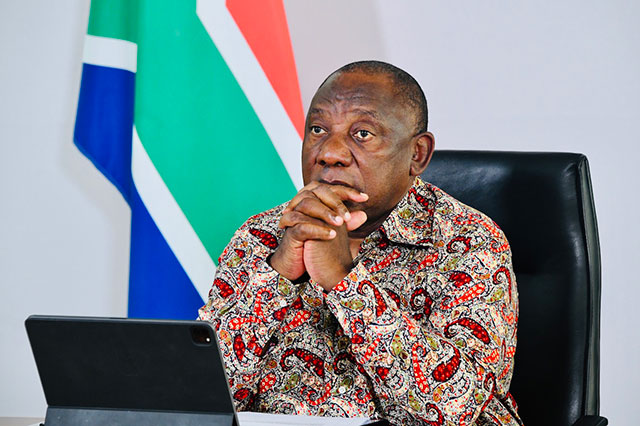Cape Town – President Cyril Ramaphosa of South Africa has reiterated the call for developed countries to fulfil their commitment to assist developing nations in transitioning to low-carbon economies.
Ramaphosa made the call in his weekly newsletter.
“While the nations of the world agreed in Paris in 2015 on urgent actions to limit global temperature rises and mitigate the impact of climate change, the effects of climate change are being increasingly felt with greater ferocity.
“Although developed economy countries promised to support developing economies as they transition to low-carbon, climate resilient societies, this support has not been forthcoming at the scale and with the urgency that is needed.
“Among other things, wealthy countries have not provided the promised finance that vulnerable countries need to adapt to climate change and to cover the cost of the loss and damage caused by climate disasters,” he said.
Ramaphosa said that this is not a matter of charity but one of economic and social justice.
The transformation of the energy landscape in Africa is a priority. As African countries we have called on the international community to support efforts to increase the continent’s renewable energy capacity while ensuring energy security for Africa’s people.… pic.twitter.com/ftDxpA9hg6
— Cyril Ramaphosa 🇿🇦 (@CyrilRamaphosa) September 26, 2023
He argued that the effects of climate change are becoming more severe and that the failure to address them will lead to economic instability, insecurity, and increased competition for vital resources like water and food.
“This is not about charity. It is about economic and social justice. Africa’s people are literally paying the price for the industrialisation and development of the countries of the north.
“It is also about shared interests because the economic and social havoc caused by climate change will make the world more unstable, less secure and will increase competition for scarce resources like water and food,” said Ramaphosa.
He added: “As African countries, we cannot be bystanders to our own development. We are putting the necessary measures in place to de-carbonise our respective economies while pursuing sustainable development.
“The transformation of the energy landscape in Africa is a priority. As African countries, we have called on the international community to support efforts to increase the continent’s renewable energy capacity while ensuring energy security for Africa’s people.
ALSO READ | Africa climate demands zero in on finance, debt and taxes
“This needs to take place alongside increased investment in smart, digital and efficient green technologies in carbon-intensive sectors such as transportation, industry and electricity,” he said.
He acknowledged that African countries are taking measures to enhance their climate resilience and transition to clean energy sources.
“As South Africa, we want to use our abundant solar and wind resources to position our country at the forefront of the clean energy transition.
“Regulatory reforms undertaken by this administration have resulted in a confirmed pipeline of renewable energy projects that are expected to produce in excess of 10 gigawatts of electricity,” he said.
Furthermore, Ramaphosa expressed concerns about measures like the European Union’s Carbon Border Adjustment Mechanism, which could increase tariffs on imports produced using carbon-intensive processes.
He cautioned that such measures might further disadvantage developing economies like South Africa by raising export costs and reducing competitiveness. He called for trade mechanisms that promote fair and equitable competition through multilateral agreements.
Follow African Insider on Facebook, Twitter and Instagram
Picture: Twitter/@PresidencyZA
For more African news, visit Africaninsider.com
Compiled by Betha Madhomu


